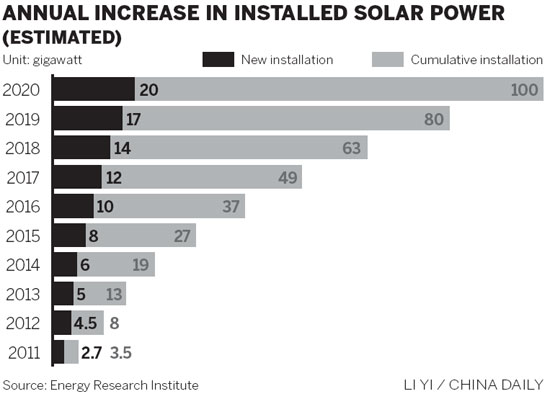China's solar giant Hanergy purchases MiaSole
Updated: 2013-01-10 11:11
By Du Juan (China Daily)
|
||||||||
Hanergy will increase MiaSole's factory output to full capacity and retain about 100 of its employees. It also plans to hire additional employees for manufacturing.
The transaction has received regulatory approval from the Chinese and US governments.
On Nov 30, Li said in Beijing that Hanergy had replaced First Solar Inc to become the world's largest maker of thin-film solar modules, with an annual capacity of 3 gigawatts.
MiaSole says it has the world's highest energy efficiency in the manufacture of thin film called CIGS, which stands for the metals copper, indium, gallium and selenide.
|
 |
The technology makes thin-film solar panels more flexible to use.
John Carrington, CEO of MiaSole, said, "MiaSole has advanced solar technology by developing the highest efficiency and lowest-cost CIGS modules, but we needed to align with a strategic partner in order to deploy our technology across a larger global scale."
Hanergy last year acquired Q-Cells SE's subsidiary Solibro, a German maker of thin-film solar panels. Solibro has developed CIGS technology for more than 25 years.
After the completion of the acquisition, Solibro increased its yearly production capacity to 100 megawatts to supply Hanergy's customers in Europe.
The lower efficiency of the thin-film solar panels compared with polysilicon solar cells has long been an obstacle in the industry.
Thin-film solar cells' energy efficiency and lifespan still have lots of room for improvement compared with polysilicon-manufactured solar panels, Meng Xian'gan, deputy director of the China Renewable Energy Society, told a conference in December.
MiaSole's thin-film solar panel efficiency has reached 15.5 percent, said to be the highest in the world.
Carrington said this efficiency will rise to more than 17 percent within two years, and the production cost will drop to below 50 US cents a watt during this time.
"The long-term target is to reduce the unit cost to 33 cents a watt," he said.
dujuan@chinadaily.com.cn
- Ikea partners with Chinese solar energy company
- Solar energy faces obstacles abroad and at home
- Grid gets first jolt of residential solar power
- PV industry boosted by govt support
- Solar industry to get jolt from new policies
- China's solar products exports drop sharply
- Chinese PV company supplies US project

 Li Na on Time cover, makes influential 100 list
Li Na on Time cover, makes influential 100 list
 FBI releases photos of 2 Boston bombings suspects
FBI releases photos of 2 Boston bombings suspects
 World's wackiest hairstyles
World's wackiest hairstyles
 Sandstorms strike Northwest China
Sandstorms strike Northwest China
 Never-seen photos of Madonna on display
Never-seen photos of Madonna on display
 H7N9 outbreak linked to waterfowl migration
H7N9 outbreak linked to waterfowl migration
 Dozens feared dead in Texas plant blast
Dozens feared dead in Texas plant blast
 Venezuelan court rules out manual votes counting
Venezuelan court rules out manual votes counting
Most Viewed
Editor's Picks

|

|

|

|

|

|
Today's Top News
Boston bombing suspect reported cornered on boat
7.0-magnitude quake hits Sichuan
Cross-talk artist helps to spread the word
'Green' awareness levels drop in Beijing
Palace Museum spruces up
First couple on Time's list of most influential
H7N9 flu transmission studied
Trading channels 'need to broaden'
US Weekly

|

|








